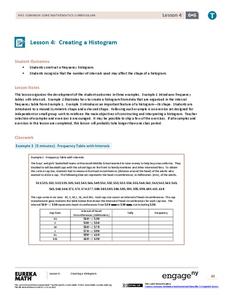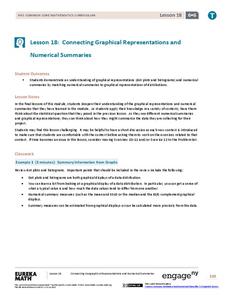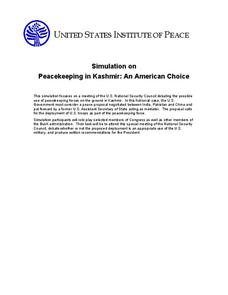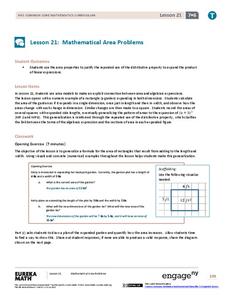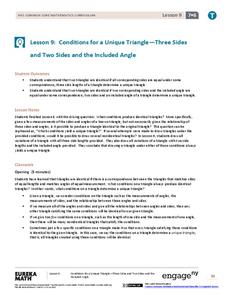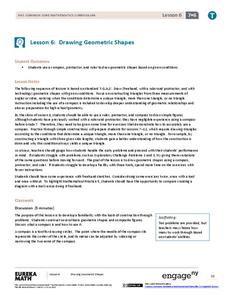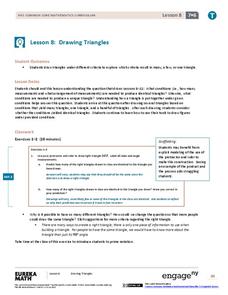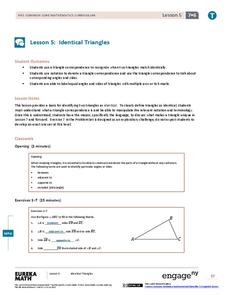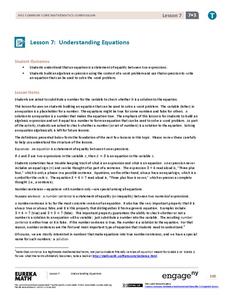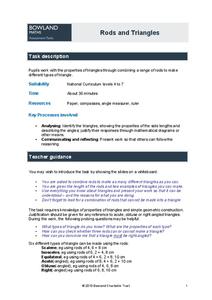EngageNY
Ordering Integers and Other Rational Numbers II
Individuals build on prior knowledge to order a set of rational numbers from least to greatest or greatest to least. As part of the lesson, they order rational numbers written in different forms.
EngageNY
Exponents
Powered up! Here's a great resource on exponents. Scholars build on their previous understanding of exponents to include all positive real number bases. Distinguishing between an and a^n is a major goal in the fifth lesson of a 36-part...
EngageNY
Creating a Histogram
Display data over a larger interval. The fourth segment in a 22-part unit introduces histograms and plotting data within intervals to the class. Pupils create frequency tables with predefined intervals to build histograms. They describe...
EngageNY
Connecting Graphical Representations and Numerical Summaries
Which graph belongs to which summary statistics? Class members build upon their knowledge of data displays and numerical summaries to connect the two. Pupils make connections between different graphical displays of the same data in...
US Institute of Peace
Simulation on Peacekeeping in Kashmir: An American Choice
Will the United States take a stand in the Kashmir conflict? A mock meeting of the minds examines a peace proposal between China, Pakistan, and India to determine if the United States should deploy troops to the area. Individuals take on...
Junior Achievement
Community and Economy
What does it take to make a town run smoothly each and every day? Scholars create their own Biztown with hands-on interactive activities. Using games, demonstrations, and decision-making skills, they learn what resources they need for a...
K20 LEARN
Where I'm From: Poetry
We carry memories of where we're from; tweens and teens can capture these memories by first listening to several memory poems and then crafting their own. They analyze literary devices other poets use, brainstorm a list of images they...
EngageNY
Surface Area
Explore finding the surface area of composite figures. Building on the previous lessons in the 29-part series, the 24th installment examines the surface area of three-dimensional solids. The focus is on decomposing composite figures and...
EngageNY
Mathematical Area Problems
Teach the connection between area models and the distributive property through problem-solving. The 22nd activity in a series of 29 explains the distributive property graphically. Learners build area models from word problems and convert...
EngageNY
Checking for Identical Triangles
Examine an assortment of triangle congruence criteria in a single lesson. Building on the four previous lessons of the series, the 13th installment provides a mixture of the different triangle congruence criteria for pupils to identify....
EngageNY
Conditions for a Unique Triangle—Three Sides and Two Sides and the Included Angle
Building on the previous lesson plan in the 29-part series, the ninth lesson plan asks individuals to construct a triangle given specific criteria. First, they are given three specific side lengths, followed by two sides and the included...
EngageNY
Drawing Geometric Shapes
Learners build confidence working with geometric tools and develop their construction techniques in the sixth lesson plan of the 29-part series. Given a geometric description, they use a compass, protractor, or ruler to create it....
EngageNY
Drawing Triangles
Create concrete examples of triangle congruence for your classes. The eighth installment of the 29-part module sets the stage for studying triangle congruence. Given a set of criteria, math scholars use constructions to build a specific...
EngageNY
The Scale Factor as a Percent for a Scale Drawing
Scholars build upon their knowledge of scale drawings by using percents to represent the scale factor. Individuals work with scaling in vertical, horizontal, and both directions.
EngageNY
Identical Triangles
Explore vocabulary and notation related to triangles and congruence. The fifth lesson in the 29-part series helps pupils build their knowledge of triangle relationships. Individuals identify corresponding parts of identical triangles and...
EngageNY
Properties of Inequalities
Class members explore the meaning of inequality by comparing numbers and building number sentences. Using number cubes, pupils find numbers and compare them using inequality symbols. As the activity continues, operations are added to...
EngageNY
Angle Problems and Solving Equations
Learners build connections between algebra and geometry as they study equation solving. The ninth instructional activity in the series of 28 asks pupils to write equations using angle relationships. After writing equations to model...
EngageNY
Solving for Unknown Angles Using Equations III
Challenge your classes to combine geometric and algebraic concepts with an activity that builds on concepts learned in the first three lessons of the series. The fourth part asks scholars to identify geometric angle relationships and use...
EngageNY
Solving Inequalities
Investigate complex problem situations by applying inequalities. Building from concepts explored in the previous lesson plan, learners read word problems and develop inequalities to represent the situation. They then solve the...
EngageNY
Understanding Equations
After examining expressions in the first six lessons of the series, learners are now ready to apply those concepts to create equations in the seventh installment of 28. Each exercise contains a conceptual situation that helps build an...
Benjamin Franklin Tercentenary
The Junto Meets Again
Out of the classroom and into the streets! With Ben Franklin’s Junto society as inspiration, learners develop their ideas for improving their communities and put them into action. After analyzing meeting notes to discover what the Junto...
MLC
Fractions Packet
Your fifth graders will appreciate the simple, direct explanations, examples, and practice exercises in this well-organized unit on fractions. Beginning with an introduction to fractions, the packet flows smoothly through the fraction...
Bowland
Rods and Triangles
Scholars explore triangles with rods of different lengths. Using rods of 2, 4, 6, 8, and 10 cm class members build as many different types of triangles as they can. They also describe properties of these triangles and determine...
Facing History and Ourselves
Emoji Emotions
The BC (Before COVID) and AC (After COVID) classrooms differ. Instructors must reestablish protocols and opening and closing routines with learners who are no longer used to in-person learning. The second routine in the series designed...
Other popular searches
- Building Materials Science
- Building Materials Strength
- Earth Building Materials
- Types of Building Materials
- Earth Materials + Building


